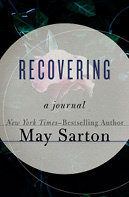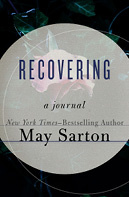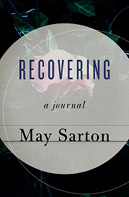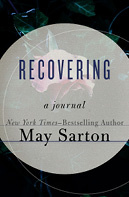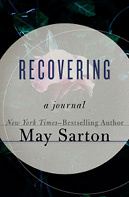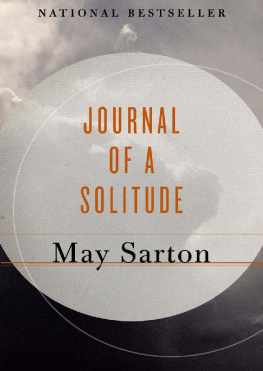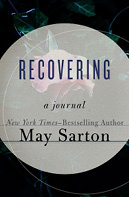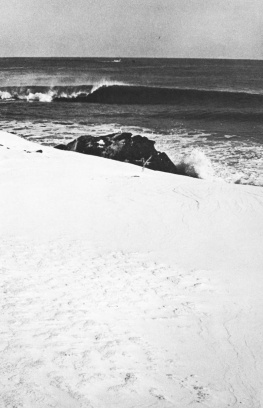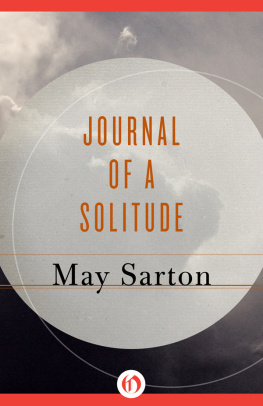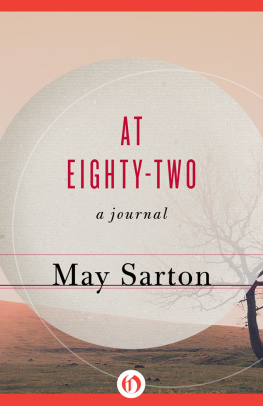Recovering
A Journal
May Sarton

Thursday, December 28th, 1978
I HAD THOUGHT not to begin a new journal until I am seventy, four years from now, but perhaps the time has come to sort myself out, and see whether I can restore a sense of meaning and continuity to my life by this familiar means.
Also I need to commemorate with something better than tears my long companionship with Judy that began thirty-five years ago in Santa Fe and ended on Christmas Day. Our last Christmas together; it was a fiasco. I wasnt feeling well and had a low fever when I went to fetch her on Christmas Eve at the Walden Nursing Home where she has been for seven years. I had been warned that she had changed for the worse in her slow progress toward complete senility, but I hoped that after twenty-four hours with me here, she would begin to relate again. That is the way it has been for the last few years and when she was here for her eightieth birthday in September, we did have a few moments of communion.
The furies have been attentive these past months and they must have worked quite hard to bring about all that took place on Christmas morning. There had been a wild gale of wind and rain all night, and when I woke at six in the dark, Tamas suddenly threw up all over the bed. (He has only done this once before.) When I tried to put on the light I realized that the electricity had gone offno heat, no light, no stove. Luckily I knew where I had a battery-powered lamp and it worked, so I was able to take off the sheets from my bed and remake it. Then I crept into it feeling sick and dreading the day ahead. I got up at half past seven and went in to Judys room to wake her, and had to change her sheets. I got her up into a clean nightgown and settled her in my bed while I went down to see what could be done about breakfast. I had no fever but everything seemed an enormous effort as though I were swimming under water. I did find the sterno and got some water started. It took nearly half an hour to heat enough for two cups of tea and we had that and cold cereal for our breakfast.
Over the years we have always opened our stockings in bed but Judy no longer enjoys opening presents so I had given up on stockings and brought up a present from faithful Emily Huntington for her to unwrap. She showed no interest in an elegant pair of gray slacks after refusing to unwrap the package. It was downhill all the way, and I began to wonder how I was going to manage. I made fires in both fireplaces downstairs and got Judy dressed in a warm sweater and slacks and settled her in an armchair with a rug over her knees beside the fire in the library. But she was very restless and was soon up, moving around in the curious shuffle that has replaced walking now. She never once looked at the tree, poignantly beautiful this year, andas it has been for thirty yearsdecorated with the many ornaments we have collected together.
It is often a small thing that shatters hope. For me it came when a male pheasant appeared close to the porch windowsuch a dazzling sight in all the gloom that I called out, Come Judy, come quickly! She didnt come, of course. I found her shuffling about in the library and by the time I had dragged her to the window, the pheasant was out of sight. At that moment I knew that Judy had gone beyond where being with me in this house means anything.
And slowly, after the light and heat came on at eleven and after I had cooked the duck and given her her dinner (I felt nauseated and couldnt eat myself), I came to the decision to take her back that very afternoon. Luckily we had carols all the way on the car radio and a dramatic sky as sun broke through in great slashes from under purple and black clouds. That drive was Christmas this year.
Now I am more alone than ever before, for as long as Judy was here at least for the holidays, and even though only partially here, as long as I could recreate for a few days or hours a little of the old magic Christmases at 139 Oxford Street and then at 14 Wright Street in Cambridge, I still had family. Better than that, for families are often not in perfect communion, and Judy and I for over thirty years have been able to rest on a foundation of wordless understanding. There is no one now with whom I can feel perfectly at home in just the way I did with Judy. She knew me, warts and all, and had long ago accepted me, warts and all, as I had her, for this was a true love.
Now it has become the past, a beneficent past. I have before me a delightful photograph of Judy and me, both smiling, on the dock at Greenings Island as we were about to embark for the shore after our last stay there with Anne Thorp. As Judy became old, we gave up on permanents; her hair is a smooth white cap like a boys and makes me remember that her friends at Smith College used to call her Mowgli.
A Christmas strangely without tenderness. Or rather with only the tenderness of strangers, for there have been nourishing letters about A Reckoning and several also begging me to do another journal by the sea. It is as if they are a special gift to help in the healing process in my life you have been a dear friend to me. Is there anyone, I sometimes wonder, who is not wounded and in the process of healing?
For me it is always poetry that comes as the healer and it was a moment of illumination when I came across this one by William Heyen in the December issue of Poetry
The Field
Each Christmas Eve, outside alone
in a field of the black sheen of snow,
I close my eyes: soon
that script appears again, roots
of the dead elms and chestnuts
underground, aglow.
The word was never lost,
my friendsas if we didnt know.
Friday, December 29th
T HE ATTACK of flu on Christmas Eve has now turned into what my father would have called the worst cold I ever had. His only infirmity until late in his life was the recurrence of head colds and, having forgotten the last one, he was each time convinced that the present one was the worst. Its amazing how quickly we forget pain after it is over, part no doubt of what seems an infinite capacity for renewal, those roots underground, aglow that Heyen speaks of in his poem.
Colette says I believe that there are more urgent and honorable occupations than that incomparable waste of time we call suffering. She means, I deduce, indulgence, what the French have a phrase for, dlectation morose, the tendency to love ones own pain and to wallow in it.
On the other hand the only way through pain, and I am thinking of mental anguish of which I have had rather too much this past year, is to go through it, to absorb, probe, understand exactly what it is and what it means. To close the door on pain is to miss the chance for growth, isnt it? Nothing that happens to us, even the most terrible shock, is unusable, and everything has somehow to be built into the fabric of the personality, just as food has to be built in.
For me the moral dilemma this past year has been how to make peace with the unacceptablewhere compromise is part of wisdom and where, on the other hand, what my old friend Pauline Prince calls your thirst for the absolute seems the commanding necessity. In human relations at least there cannot be an absolute and to demand it is to be a wrecker as I have sometimes been. So the word that has run through these past months has been accept, accept. How unregenerate I feel when I rebel, as I do most of the time, against accepting!
The light these December mornings has a rather special quality; austere, cold as it is, it has amplitude, a spacious austerity. I live with a wide semi-circle of horizon over and beyond the bare field. Snow would make it richer, but in my mood at present, I rest on the cold gray sea. And wait for the suns rays to catch a tiny prism Karen Saum hung in my bedroom window, wait for that sudden flame, first crimson then sometimes a flash of blue, startlingly alive.
Next page
